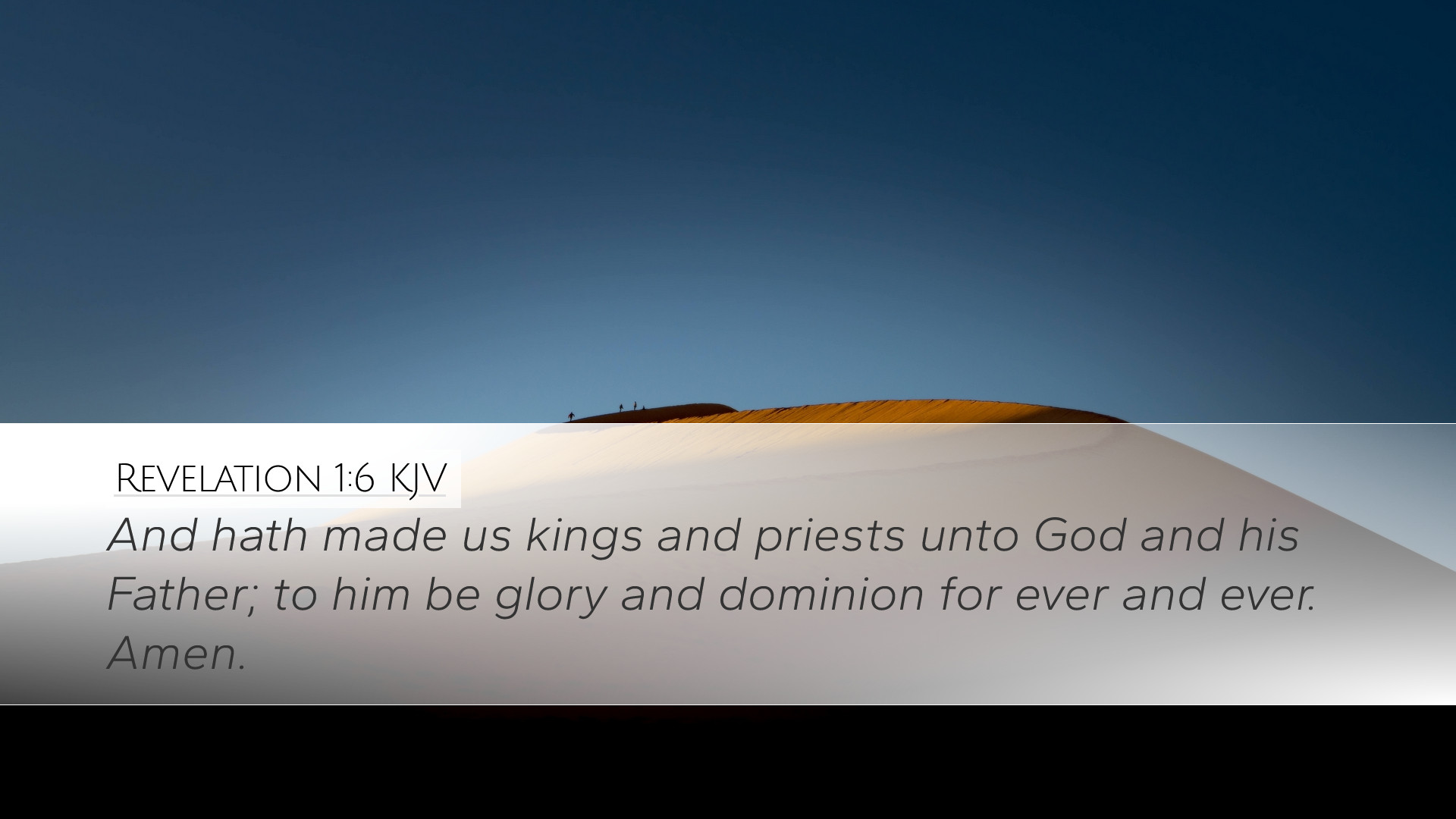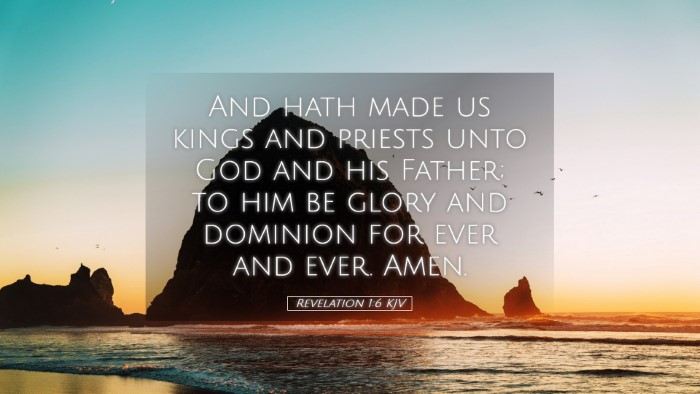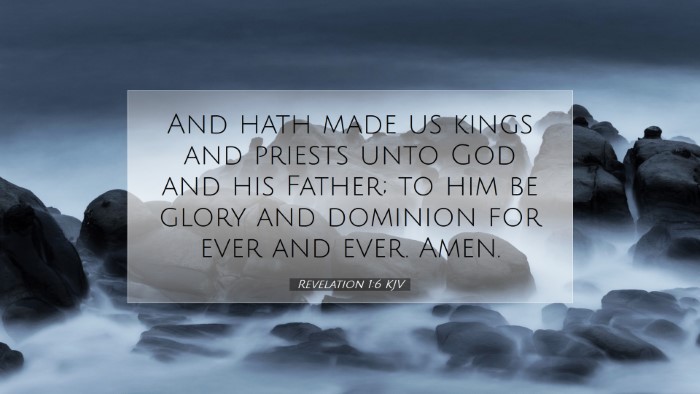Commentary on Revelation 1:6
Verse Reference: Revelation 1:6 - "And hath made us kings and priests unto God and his Father; to him be glory and dominion for ever and ever. Amen."
General Overview
The book of Revelation, attributed to John the Apostle, presents a series of prophetic visions concerning the end times. Revelation 1:6 is a profound verse that encapsulates the identity and purpose of believers in Christ. This commentary synthesizes insights from several public domain commentaries to elucidate its significance for pastors, students, theologians, and Bible scholars.
Exegesis and Insights
1. Kings and Priests
Matthew Henry emphasizes the dignity conferred upon believers through Christ. He notes that believers are not only redeemed but also appointed as “kings and priests.” This title indicates a dual role: exercising authority and engaging in priestly duties. The use of 'kings' suggests a royal lineage, reflecting the believer’s share in the kingdom of God, while 'priests' signifies a calling to worship and serve God intimately.
Albert Barnes further discusses the implications of this royal priesthood. He refers to 1 Peter 2:9, where believers are described as “a royal priesthood.” This status highlights the transformative power of salvation, allowing believers to approach God directly and serve as intercessors for others. Barnes stresses that this empowerment should lead to a life of holiness and dedication to God's service.
Adam Clarke adds that this dualrole aligns with the broader biblical narrative. Drawing parallels to Old Testament functions, Clarke points out that, like ancient Israel, believers are called to mediate between God and the world, showcasing God's glory through their lives. The church serves as a holy nation, emphasizing its distinctiveness and purpose in a fallen world.
2. Acknowledgment of God’s Sovereignty
The latter part of the verse, “to him be glory and dominion for ever and ever,” offers rich theological significance. Here, believers are invited to recognize and proclaim God’s sovereignty. Matthew Henry asserts that this doxology affirms God’s ultimate authority—His glory is paramount, and His dominion is eternal. Such declarations should prompt a response of worship and reverence from believers.
Albert Barnes urges readers to contemplate the eternal nature of God’s kingdom. It serves not only as a commitment to ascribe glory to God but as a reminder of the enduring reign of Christ. This acknowledgment thrusts the believer into a constant state of worship that transcends temporal circumstances, reinforcing the belief that God reigns supreme despite earthly trials.
Adam Clarke points out the implication of “for ever and ever” as a clarion call for believers to reflect on the eternal nature of God’s promises. Clarke explains that this expectation encourages a life lived in hopeful anticipation of the eventual consummation of God’s kingdom, reinforcing believers’ spiritual resilience amid suffering and persecution.
Theological Implications
1. Identity in Christ
This verse invites believers to embrace their identity in Christ as kings and priests. Matthew Henry's interpretation encourages believers to consider the magnitude of their redemption—a transition from slaves of sin to rulers in the spiritual realm. This new identity empowers them to live victoriously and serve faithfully.
Albert Barnes emphasizes that understanding one's identity as a part of a royal priesthood carries responsibilities. It calls for a life of integrity and faithfulness, recognizing that believers are representatives of Christ on earth. Such realization leads to a higher standard of living and community engagement, embodying the principles of God’s kingdom.
Adam Clarke further emphasizes the ethical implications of this identity. The duty of a priest and king entails leading others toward God and proclaiming the Gospel with boldness and grace. Clarke encourages believers to manifest Christ’s character in their daily lives, demonstrating the transformative power of the Gospel to a watching world.
2. Eternal Perspective
Revelation 1:6 holds an eternal perspective that challenges the believer's focus amidst worldly distractions. Matthew Henry highlights the essential nature of worship in recognizing God’s glory, stating that worship aligns the believer’s heart with heavenly realities.
Albert Barnes reiterates that this perspective engenders hope, allowing believers to endure earthly challenges with resilience. When acknowledging God’s eternal dominion, they are reminded of their ultimate purpose, which is found in glorifying God through their lives and witness.
Adam Clarke expands on this idea, indicating that this eternal focus empowers believers to live with purpose. It enables them to rise above temporal sufferings, remembering that their present trials are not in vain but serve a larger narrative within God’s redemptive plan.
Practical Applications
1. Living as Royalty
Understanding the believer’s identity as a king and priest transforms their approach to daily life. Matthew Henry urges believers to conduct themselves with dignity, reflecting the character of their King in their interactions. This includes a commitment to prayer, service, and living a life dedicated to righteousness.
Albert Barnes encourages believers to act as representatives of Christ's kingdom, advocating for justice, mercy, and truth in their communities. This reflects an active participation in the life of the church and the world, extending grace as Christ did.
Adam Clarke suggests that living as royalty also means engaging in intercession, showing empathy, and working towards the common good of society. Each believer is called to priestly duties, fostering an environment where God’s presence is acknowledged and celebrated.
2. Embracing Worship
In recognizing God’s glory and dominion, worship becomes central to the believer's life. Matthew Henry posits that true worship is both an act of reverence and an expression of joy in God’s greatness.
Albert Barnes highlights the importance of corporate worship, emphasizing that the collective acknowledgment of God’s sovereignty strengthens the community of faith. Participating in worship is where believers reinforce their identity and mission as royal priests.
Adam Clarke elaborates that personal worship should nourish public worship, inspiring believers to cultivate a heart of worship in every aspect of life. This includes prayer, reading of the Scriptures, and acts of service that glorify God and edify the church.
Conclusion
Revelation 1:6 serves as a powerful reminder of the believer's identity and purpose within the kingdom of God. Through insightful reflections from Matthew Henry, Albert Barnes, and Adam Clarke, this commentary underscores the profound truth that believers are made kings and priests unto God. Their lives are to resonate with worship and service as they engage in their royal duties, all while acknowledging and glorifying the eternal dominion of God.
As pastors, students, theologians, and Bible scholars meditate on this verse, may they be inspired to live out their identities faithfully, embracing their roles with dignity and purpose, fundamentally changing their communities and the world for the glory of God.


